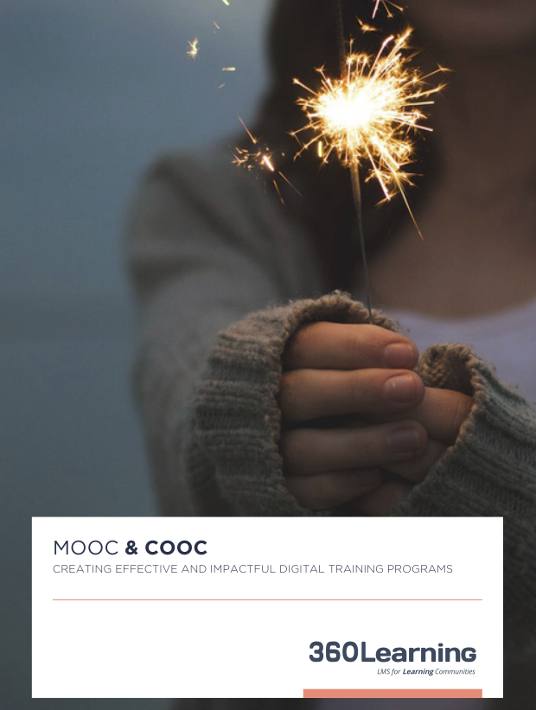MOOC & COOC – Creating Effective And Impactful Digital Training Programs
If you are new to MOOCs, then you’ll probably have questions. Perhaps too many questions, but that’s no reason for you to be deprived of the knowledge you seek. Through these pages, you’ll figure out the foundations of MOOCs, how to design one, and with what ingredients. The focus is mostly on the corporate side, but you’ll be greatly assisted whether your goal is to set up a MOOC or a COOC.

The idea for Massive Open Online Courses has been realized ten years ago, but its theoretical history goes way back. For those new to MOOCs, it would surely be helpful to read how things have come to be. Even more, learn about COOCs and how to structure a corporate MOOC. MOOC & COOC - Creating Effective And Impactful Digital Training Programs also includes examples, and 360Learning’s proposition for COOCs, making it worth your time and attention.
About The eBook
It’s been a fascinating journey of knowledge for MOOCs so far, fulfilling their technical and ideological principals. Delving into MOOC & COOC - Creating Effective And Impactful Digital Training Programs you’ll get the whole notion, plus their corporate version. There is even a step-by-step guide to structure such a course, followed by examples, all figurative and explanatory. The same applies to the last section, where you can have a taste at how COOCs look like with 360Learning, which most likely you’ll find very enticing.
Here are the key chapters of the eBook:
- What’s A MOOC?
- COOCs
- Structuring A Corporate MOOC: Step-By-Step Guide
- Example MOOCs
- COOCs With 360Learning
Combining the concept of distance learning and the idea of “Education for all”, Massive Open Online Courses were bound to go big. Starting plain and simple, MOOCs have stacked up tons of courses, using various online tools to assemble learning content. These online courses respect certain technical specifications and the following four characteristics: they leverage web formats, are collaborative, contain evaluation modules, and are limited in time.
Getting on to COOCs, which is the corporate expression of MOOCs. They can be external, where anyone can sign up, most times for free, in a structure similar to university-level MOOCs, or internal that apply the same methods and modalities, but in a closed environment. You can read an analysis of external COOCs, their use as communication tools, client education and expertise certification, corporate branding, and sourcing. You also get the main differences of internal MOOCs to traditional eLearning.
The focus moves on to the structure of corporate MOOC, and 360Learning offers a step-by-step guide within the pages of MOOC & COOC - Creating Effective And Impactful Digital Training Programs. You can learn how the workload is divided and all the other steps required. These are: defining educational content, production, technical integration, communication, course animation, and course overview. Chances are that you’ll be reading those repeatedly, as they contain loads of valuable insight.
Towards the end, the authors of this volume deal with certain types of MOOCs, in a way of giving advice and examples. Read on what a module is, how it should be, and how to integrate your content in a quick and efficient way. You’ll also be introduced to the various formats that a course can take, plus a presentation of a typical case study, and a typical course exam module. The eBook closes with a gallery of screenshots showing you how good COOCs done with 360Learning can look like.
If you want to discover all there is to know for structuring MOOCs and COOCs, download this eBook today.






